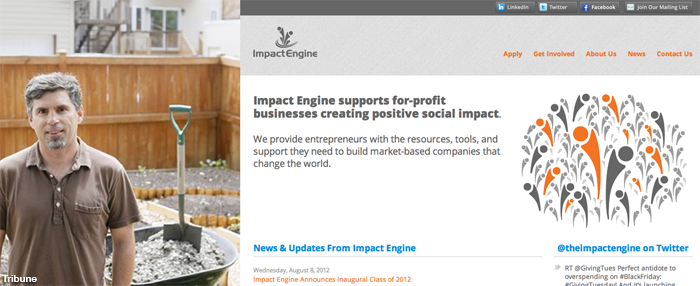Entrepreneur savant Chuck Templeton describes himself as an environmental alarmist. Templeton, known for founding restaurant-reservation site OpenTable with his wife, co-founded resource-sharing platform OhSoWe last year to much eco-friendly praise. The backyard composting, urban gardener is now back in the fluorescent spotlight with the recently announced inaugural class of eco-social impact startup incubator, Impact Engine.
And while it seems like he’s got a lot on his biodegradable plate, Templeton hopes Impact Engine will offer staggering opportunities for Chicago.
Impact Engine’s primary mission is to help grow and mentor the eight early stage societal and environmental problem-solving companies entering into its startup bootcamp. Appropriately located at 1871, rubbing elbows with three-year-old incubator Excelerate Labs, Impact Engine startups range from “empowering women in rural India to improving education in the United States.”
Aside from being surrounded by prevalent talent at startup hub 1871, Managing director and early investor, Templeton will be working with founders Jamie Jones, assistant director of social enterprise at Northwestern University’s Kellogg School of Management and Linda Darragh, executive director of Kellogg’s Levy Institute for Entrepreneurial Practice, along with a deep bench of advisors and mentors.
We chatted with Templeton about Impact Engine’s first class, what makes eco-social business models different from other startups and why he and his wife make such a great team.
Doejo: I’ll start off with the big question: What makes for an ideal candidate for Impact Engine? What were you looking for and how were the final eight chosen?
Templeton: We were looking for a few different things. First we wanted to make sure we felt we could help/ add value to the company. We saw some very promising organizations, but we were not sure we could add value. So we focused on companies that we thought we could help with our networks, skills and industries. Second, we wanted to focus on companies that had the revenue model and the opportunity they were addressing to be linked, so that if you pulled one out that the other wouldn’t work. So we are trying to avoid the ‘buy one, give one’ models. The more profitable a company is, the more good it is doing. Finally we wanted to find companies that would have an impact. Scale was less important, impact was most important. Maybe a company would not be very big, but might change an industry. As long as it was a good investment also, we were excited to find those businesses.
What other impact-investing startup incubator did you look towards for inspiration?
There are two out of San Francisco that we focused on. One is Hub Ventures and the other is GreenStart.
How do you hope to work with and grow alongside 3-year-old incubator and fellow 1871 tenant, Excelerate Labs?
There is a lot we can learn from Excelerate Labs and I plan to. Chicago is a great place to start a company and I think there is room for two accelerators here. With that said, I wish they would focus on businesses that have a positive impact on humanity.
We have some huge challenges out there and we can’t afford to have any business anymore solely built purely to make money.
All businesses, entertainment, food, energy, news, collaborative consumption … should all be built with the idea of making money, while addressing environment and/or societal issues.
What do you think you would have learned/ done better had you been in an incubator program with OpenTable?
Oh, so many things. I was lucky to have a great team around me at OT, from the employees, to some of the first customers, to our board of directors and to our investors. Had we not had the team that we did, OpenTable would not have had the success it had. But the most important thing that I think I would have learned is how hard building a successful business really is. It takes time to build a great company. Getting the right product market fit, pricing, people, the capital, organization structure, technology, real estate, timing … It takes longer than you think.
How is an incubator for for-profit eco-social impact companies unique from other incubators? How is the mentorship primarily different?
Again, I think that all incubators and any company starting now should address some of the huge societal and/ or environmental issue we face. The challenges we have are big and growing, on a finite planet with an increasing population. So there is a lot of opportunity for many great and profitable companies. Our mentorship plan is to try to find a few candidates for each company, which hopefully one can ultimately be a lead mentor. The lead mentor will work with each company to help it find the right mentors it needs to help it think about specific issues facing the business.
What do you think the future looks like for incubators, accelerators and impact investors? What are these groups doing right and wrong?
Well three months is not enough, but I am not sure what the right amount of time is. I also think that batching it, like we are doing as an accelerator, might not be the best way to run a program either. Just like most things there will probably be a boom cycle, followed by a bust cycle, but at some point the good (and lucky) ones will settle out and you will get to a norm. They are not for every company and not everyone should be starting one. We feel like we have a great foundation, experience and a supporting team to give ours a good chance of success, but its not easy for sure.
At June’s Technori Pitch you said that your Chicagoan wife was one of the reasons you moved back to Chicago to direct Impact Engine here. She also helped inspire OpenTable you say—How has she inspired your entrepreneurial track?
My wife has played a big part in my professional life. For one, we had a partnership. She had the steady paying job, is more risk adverse and more stable. I am more risk seeking, can’t stay with one company for too long and like to change things up. So her stability gave me the chance to take a risk and it not be critical if I failed. Plus she is one of my best sounding boards when it comes to thoughts and ideas. I am the big dreamer and she is the one that keeps me (somewhat) grounded. It’s a great mix and it works well for both of us.
When you’re not swamped with work getting Impact Engine off the ground, what are your favorite hangouts in Chicago?
I like locally owned businesses. With kids I don’t get out as much as I used to (which suits me well), but I’d have to say anything locally owned.

